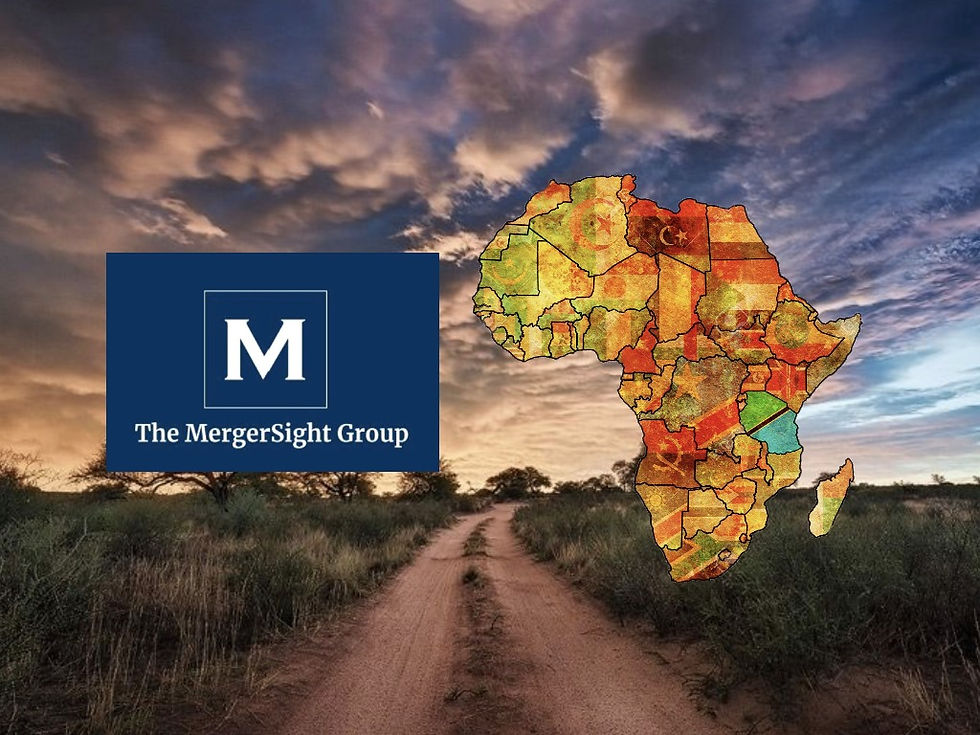Emerging Markets News - Africa
- The MergerSight Group
- May 25, 2021
- 4 min read
By Tim Bamberger (Kings College London)

GENERAL NEWS ON AFRICA - TRENDS
Economic suffering in the global south triggered by the COVID-19 pandemic continues to dominate the continent. In particular, Sub-saharan African countries experience heavy economic and social pressures. Economic decline is mainly a result of export adjustments that have a devastating knock-on effect on commodity-exporting countries. Due to fewer exports, African governments have made less revenue from taxes, which has prevented them from providing emergency rations and medical services to their citizens. Covid-19 hit the Southern African economy the hardest. Heavy lockdown measures in combination with declining commodity prices have led to an overall economic decline of 7% in 2020 but are set for only a 3.2% recovery in 2021.
On a more positive note, North African countries largest companies have reported record-breaking profits for the first quarter of 2021. Maroc Telecom reflected the strongest gains, as its market capitalisation rose from $11bn in 2020 to $13.5bn in March 2021.
CRYPTOCURRENCIES & BLOCKCHAIN - AFRICA
Cryptocurrencies are slowly becoming a generally accepted means of payment. Large Corporations like PayPal are pioneers in allowing for payment with Bitcoins. The potential for Crypto in Africa is particularly strong because 60% of the world’s mobile money is already passing through the continent's data centres. Nigeria is the world’s second-largest bitcoin market after the USA. Monthly cryptocurrency transfers to and from Africa under $10,000 have risen by 55% in 2020.
Critiques have indicated that the anonymity of cryptocurrency traffic in Africa is not necessarily a good sign, because illegal activity could be part of these numbers, too. African countries tend to have less enforced legal systems which would indeed allow for online crime and money laundering to take place without any authorities noticing. With alternatives to traditional fiat government currencies, which have historically been exposed to many errors and negative side effects, cryptocurrencies could potentially offer a solution.
Chris Becker, the blockchain technologies lead at the South African-based international banking group Investec, said “The emergence of cryptocurrencies may help some African economies in the long run. These competing currencies are operating alongside domestic currencies, which I think will give these economies an increased level of resilience,". Another distinct advantage of cryptocurrencies is that they avoid bank fees and also skip the cost of converting money into different currencies when transferring to or from the West.
COVID-19 IMPACT ON AFRICA - CHINA RELATIONS
Experts are expressing concerns about the amount of debt that African countries are taking on from Chinese Investors. The question of whether Africa can grow the financial muscle to service and repay these debts dominates in current economics and business of the global south journals. Some predict China to write off most debt, whilst others predict a doomsday scenario where economic colonisation materializes. Beijing has provided over 10.7 billion dollars in debt relieves over the last few years already making it unlikely to grant more.
As COVID-19 death and infection numbers dropped in China, trade with Africa has picked up again. Commerce between both rose by 26.9% for the first quarter of 2021, indicating a slow recovery to pre-pandemic levels of economic and social development. Analysts have however indicated that this path to recovery will most likely take 3-5 years. Critics have indicated that for this growth to persist in the long term and be sustainable, African economies need to expand and grow their domestic manufacturing industries to ultimately create more jobs.
Economic downturns have been largest in the continent’s three biggest economies (Angola, Nigeria and South Africa), as they heavily rely on commodity exports. Angola now shows the most robust increase in trade with China, whereas Ethiopia and Kenya lead the decline in trade with India. China and India have started vaccine and medical equipment distribution centres in sub-Saharan Africa.
INFRASTRUCTURE INVESTMENTS - NIGERIA
Nigeria has announced multibillion-dollar plans, which aim to improve the long-overdue infrastructure deficit. Megaprojects across the country provoke a new influx of capital and investments. The new airport, road and railroad projects are currently breaking ground under the close watch of regulators and President Muhammadu Buhari's administration. One of the key ambitions of Buhari’s government has also been the completion of failed or intransparent projects under previous administrations, such as the infamous Mambilla Hydropower plant. (Source: African Business)

ZIMBABWE – DIAMOND MINES
Zimbabwe is struggling to secure fair compensation for its vast mineral wealth. Maximizing government revenues from the mining sector has presented itself as a complex matter. Turning the sector over to nationalised mining companies has rarely optimised mining revenues. Improvements are needed in management practices, regulations, and the investment environment.
The country’s president, Robert Mugabe, announced: “the government will take over all diamond operations”. This press release was published soon after the government failed to renew mining licences. Private mining companies were ordered to cease operations, leave their equipment and vacate their premises.
Zimbabwe's government now holds a 50% share in diamond operations through ZMDC. Despite this, it has reportedly received insignificant revenues from the sector in recent years. However, because of large levels of corruption, tax payments on profits are mostly negligible. Transparency and corruption continue to dominate large parts of the continent. Whether these findings hold the potential to be generalized remains to be discovered. However, on a more macro level, recent studies debate whether colonial histories or the lack of good democratic principles are to blame for this emerging markets phenomenon.
